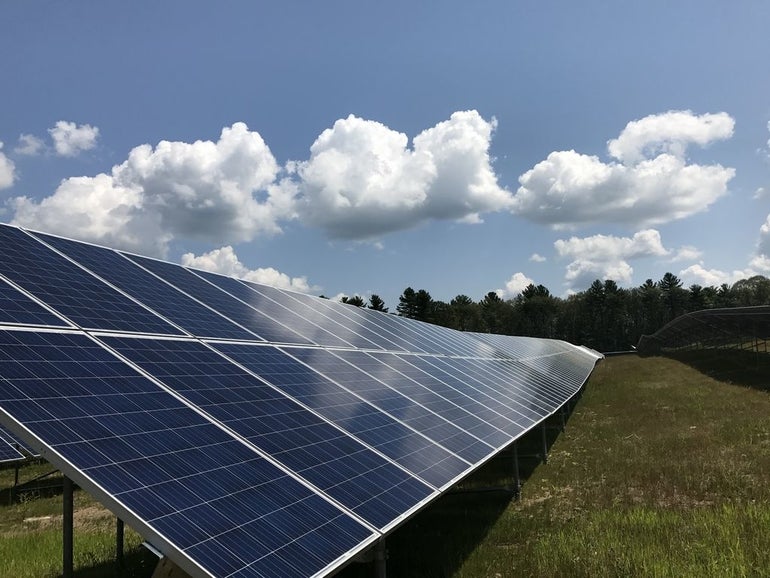The Baker administration rolled out the final regulations Tuesday for a first-in-the-nation financial incentive program that aims to promote clean energy generation to supply power when demand on the grid is at its highest, and officials said it will help reduce greenhouse gas emissions and save ratepayers money.
The clean peak energy standard would require every retail electric supplier with a contract signed or extended since the start of 2019 to provide a minimum percentage of its kilowatt-hour sales to end-use customers in Massachusetts from “clean peak” resources — renewables, energy storage systems or “clean energy technologies that can supply electricity or reduce demand during seasonal peak demand periods.”
The idea is to address periods of the greatest demand on the electric grid — when power generators sometimes turn to dirtier fossil fuels.
“Increasingly we’ve seen, in past years, just monumental electric bills from these cold snaps where we rely on oil … this is the first effort, really, to try to target our renewable policy to rifle shot at what has long been an Achilles heel of Massachusetts and our vulnerability to our natural gas pipeline shortage, and our reliance on oil and imported LNG,” Patrick Woodcock, commissioner of the Department of Energy Resources, said. “So we’re really trying to harness all of our renewable energy and target those peak periods in the summer and winter.”
Woodcock said about 10 percent of hours — the peak periods — account for roughly 40 percent of the overall energy costs in Massachusetts. The clean peak standard program, which was authorized by the Legislature in a 2018 energy law, is modeled on the state’s Renewable Portfolio Standard (RPS).
Essentially, if a power producer generates clean energy between 3 p.m. and 7 p.m. in the summer months or between 4 p.m. and 8 p.m. in the winter months, it will make available a Clean Peak Energy Certificate (CPEC). Electricity suppliers are obligated under the program to buy a certain amount of CPECs each year, based on a percentage of the amount of electricity that they supply. DOER has established a minimum standard that 1.5 percent of sales by retail electricity suppliers must be met with clean peak energy certificates in 2020, and that minimum would increase by at least 1.5 percentage points each year.
“The Clean Peak Standard enables the Commonwealth to achieve deeper emissions reductions, provide energy savings to residents and businesses, increase energy resiliency, and meet the many challenges posed by climate change,” Energy and Environmental Affairs Secretary Kathleen Theoharides said. “By ensuring the use of clean energy resources at the historically dirtiest and most expensive times of the day, we will be able to build on our progress in meeting our net zero emissions goal and building a clean energy future for Massachusetts.”
Gov. Charlie Baker said the Massachusetts program could serve as “a national role model” for how to make meaningful reductions in greenhouse gas emissions.
“To combat climate change, we need to change the way we consume our energy, the resources we use, and when we use them,” Baker said.
Woodcock said that DOER predicts the clean peak energy standard “will provide savings of half a million metric tons [of carbon dioxide emissions] in the first 10 years, and continue to enable growth of renewable resources.” He said the program will also eventually benefit electric ratepayers in Massachusetts, who pay more for electricity than almost any other state in the continental United States.
He said the savings to ratepayers will exceed the cost of the program, but conceded that “there will be an incentive that will be required to jumpstart these types of resources in the first few years.”
By shifting clean or renewable power, which is not produced on demand, to the hours when it is most valuable to the electrical grid, the clean peak energy standard program also seeks to increase the opportunities and possibilities for energy storage.
“We do see benefits for ratepayers from this program,” Woodcock said. “And moreover, from a commonwealth standpoint, we do certainly think that this program will further jumpstart the electric storage market and provide economic benefits for new generation of electric storage in the commonwealth.”
The clean peak energy standard application portal, which is managed by the Massachusetts Clean Energy Center, is scheduled to launch Aug. 17. MassCEC and DOER will jointly host a stakeholder informational session on Aug. 10 to provide more information.

